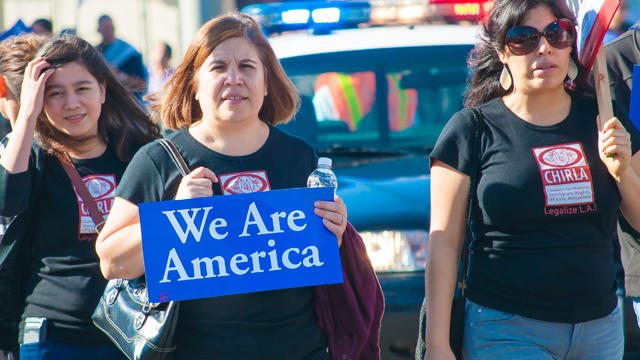
Angelica Salas at an immigration reform rally in Van Nuys, California with day laborers, students and household workers. (Photo Credit: Jorge-Mario Cabrera)
Three years ago, when leaders of the immigrant rights movement met with President Obama in the White House, Angelica Salas challenged the president’s claim that his administration was focusing on deporting criminals and other security threats. “No, Mr. President, that’s not what’s happening,” Salas told Obama. “You’re deporting heads of households, mothers and fathers. Young people are sitting in detention centers when they should be sitting in the best universities in the country.”
Last year, Obama agreed to suspend the deportation of, and grant work permits to, the young “dreamers” who came to the U.S. illegally as children.
Salas, the 42-year-old executive director of the Coalition for Humane Immigrant Rights of Los Angeles (CHIRLA), has been a potent force in the struggle for comprehensive immigration reform. One of the national movement’s key strategists, she is a powerful speaker, a brilliant organizer and a remarkable coalition builder who works closely with unions, faith groups and students. She is no stranger to jail cells as a frequent participant in civil disobedience. She played a key role in several recent major victories in California, including bills allowing undocumented immigrants to obtain driver’s licenses, prohibiting local police from turning over undocumented immigrants to federal officials for possible deportation and giving undocumented college students access to public financial aid.
Salas views her job as “telling stories” — giving voice to the immigrants whose lives are often ignored or misreported. She sees her own story in those lives; she was smuggled into the country at age five by her 14-year-old aunt. They were caught and sent back to Mexico, but they made it across the border on a second try. The family was torn apart again when federal officials raided the sweatshop where her mother worked and deported her. They were eventually reunited in Los Angeles, where Salas grew up. She joined CHIRLA after finishing Occidental College and became director of the group in 1999.
Salas and CHIRLA have established day-laborer job centers, registered more than 75,000 new immigrant voters and led the fight for in-state tuition for undocumented students. Much of CHIRLA’s work involves what Salas calls “handing the baton” — recruiting and training the next generation of activists.
| « Previous: Ethan Rome |

